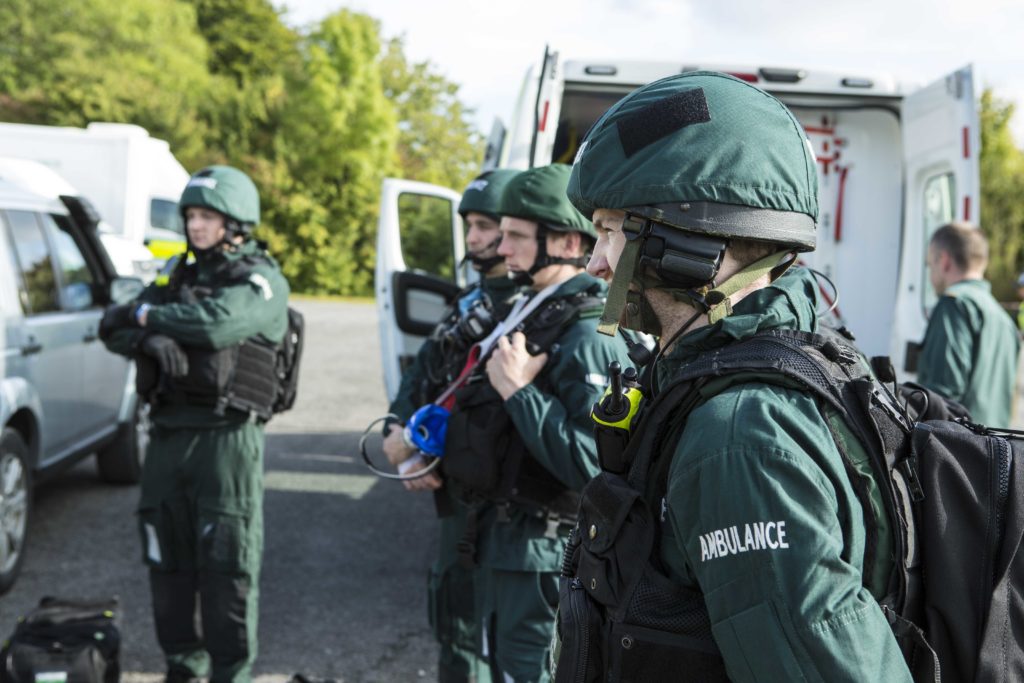
Emergency services workers are reminded daily just how unpredictable modern life can be. On the front line responding to difficult, dangerous, challenging and unusual incidents is part and parcel of life in the ambulance, police and fire and rescue services. In the NHS ambulance service, responding to these incidents can be a matter of life and death. Getting to patients in these difficult situations, stabilising them on-scene and then getting them to hospital is often the primary aim.
Words: Carl Rees, Stakeholder Engagement Lead, National Ambulance Resilience Unit (NARU)
For a PDF version of this article from the August 2018 edition of Emergency Services Times, click here.
The NHS-funded National Ambulance Resilience Unit (NARU) has been in place since 2011 as a central support unit for all UK ambulance services, to ensure the ambulance service as a whole can respond to these difficult incidents in the most effective way possible. It is co-located with the National CBRN Centre at Ryton-in-Dunsmore (Coventry, UK) and works closely with fire and rescue services. NARU is an NHS body, funded by NHS England and hosted by West Midlands Ambulance Service NHS Foundation Trust.
Comprised of a group of highly experienced ambulance service professionals the unit exists to train and equip specialist operational staff from each service so that they have the right tools, the right knowledge and the right attitude to be able to enter challenging and hazardous situations with the confidence and ability to save lives, while mitigating the risks to their own safety. NARU also supports the development and training of command and control staff for the whole ambulance service. These commanders play vital roles in mass casualty major incidents.

HART training
NARU has a specialist Education Centre (based just outside Salisbury, UK) which provides world-class training to hundreds of specialist ambulance staff each year including every member of regional Hazardous Area Response Teams (HARTs).
It has a Capabilities Team that searches for the best kit and equipment on the market, rigorously testing each item before specifying for national supply. It also oversees the provision of additional support for pre-planned and spontaneous incidents for all ambulance trusts.
A highly experienced NARU Medical Advisor provides specialist medical input to the work of the whole team.
NARU also has a Compliance and Assurance Team that develops and improves national standards for use by all ambulance services. The fundamental aim is to keep specialist responders safe while taking calculated risks to improve the clinical outcomes of patients caught within dangerous environments. National Standards ensure the specialist capabilities remain consistent enough to operate safely as part of a combined response to national emergencies.
Recent activity
Since 2006, the UK threat level from terrorism has stayed largely constant between Severe and Critical – its two highest levels.
This heightened state of alert makes it all the more imperative that NHS ambulance services have a robust, coordinated way of preparing for the unthinkable – and acting quickly and effectively when it occurs.
The national capabilities coordinated by NARU have been deployed to a number of recent high-profile emergencies, including:
- The Somerset floods
- The terrorist attacks at Westminster Bridge and Borough Market
- The Manchester Arena terror attack
- The nerve agent attack in Salisbury
- The follow-up nerve agent incident in Amesbury
In addition to these national emergencies, the specialist capabilities coordinated by NARU are used on a daily basis to provide care in hazardous situations.
Current utilisation levels per annum (figures for 2017/18) are as follows:
Capability: IRU (CBRN or Hazardous Materials)
Response/Mobilisations: 5,035
On Scene Deployment to provide patient care: 2,721
Capability: USAR (working at height / in confined space / difficult access)
Response/Mobilisations: 6,236
On Scene Deployment to provide patient care: 3,844
Capability: Water Operations (including flooding and swift water rescue)
Response/Mobilisations: 1,054
On Scene Deployment to provide patient care: 582
Capability: Support to Security Operations (including MTFA and police operations)
Response/Mobilisations: 775
On Scene Deployment to provide patient care: 585
Capability: Other (including specialist support, critical incidents, etc)
Response/Mobilisations: 6,280
On Scene Deployment to provide patient care: 4,653
(You can view this info in table format here.)
A central platform of support

NARU National Director Keith Prior says:
NARU’s role is vital to the effectiveness of emergency preparedness, resilience and response across the ambulance service and within the wider NHS.
NARU provides the central platform to enable individual ambulance services to work consistently and effectively in the delivery of highly technical capabilities. These capabilities save lives and improve clinical outcomes for a wide range of patients caught within dangerous and challenging circumstances.
The unit develops and produces a broad range of training aids and operational publications (for example National Major Incident Action Cards), which are used daily by thousands of ambulance staff. Additionally, NARU coordinates and develops several central resources designed to help all ambulance trusts to share best practice and learn from each other.
NARU’s bespoke PROCLUS system leads the way in helping identify lessons learned from every day responses to challenging events by Hazardous Area Response Teams (HARTs) from every ambulance service in the country. It also provides a central informatics platform for use by all ambulance trusts.
Recruiting new specialist responders and monitoring their well-being when they start work in the service is also a vital part of the NARU remit.
Positive benefits
Although much of its work is ‘behind the scenes,’ there can be no doubt about the broad range of positive benefits that NARU brings to the table when it comes to national resilience and civil contingency.
NARU supports NHS England and the Department of Health and Social Care through the provision of policy advice and helping share national emergency preparedness strategies.
Advice and expertise in all things related to emergency preparedness, resilience and response in the ambulance service is the starting point, but its rigorous work in identifying, training, equipping and monitoring the wellbeing of the excellent staff who become specialist responders each year is the real benefit that becomes most visible to the wider public when high profile incidents occur.
It is HART staff trained by NARU and HART vehicles specified by NARU that the public sees on their TV screens in the aftermath of terror attacks. These specialist ambulance responders are all working to national standards developed and refined by NARU.
They are using resources and materials developed by NARU to help them save lives. Their teams undergo assurance processes led by NARU (on behalf of NHS England) to ensure they remain fit for purpose.

























